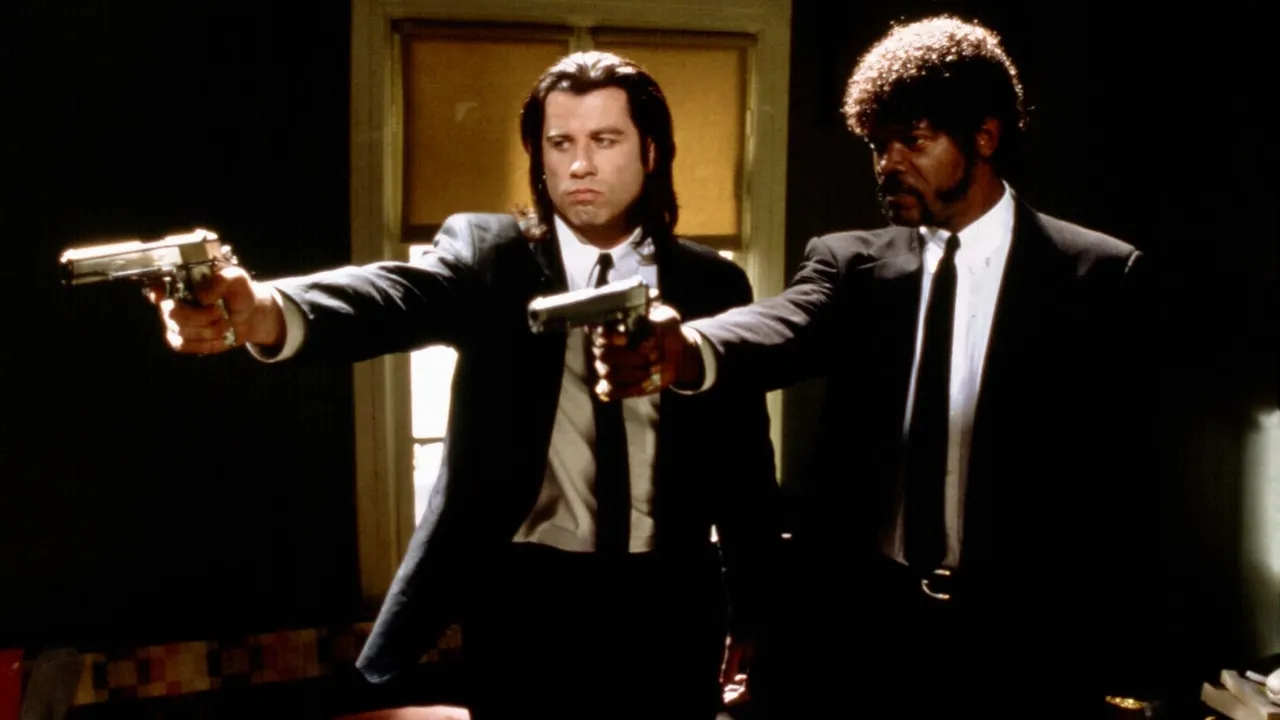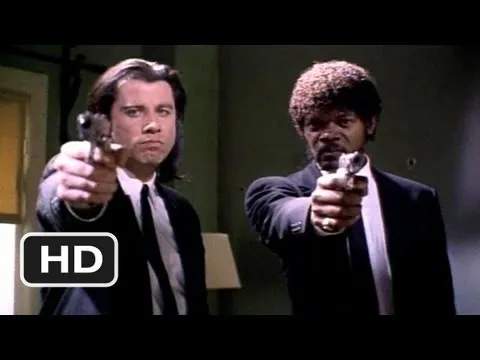
Long time ago, the author of this review used to meditate about sort of the films he would have made. My desires were expressed in long and detailed discussions with friends who had shared my filmophile passion and we often wondered when or if such movies are going to become reality. Eight years ago, a young and relatively unknown American filmmaker delivered one such movie - perfect embodiment of everything that the author of this review had desired to see on the big screen. But this film was something more - cinematic triumph, hailed by critics and loved by general audience and, therefore, bound to receive instant cult status and later become one of the landmarks in the history of Seventh Art. This film was Pulp Fiction, 1994 black comedy directed by Quentin Tarantino.
The plot, based on the screenplay by Quentin Tarantino and Roger Avary, is set in Los Angeles underworld and consists of three separate, but connected stories. The protagonist of the first one is Vincent Vega (played by John Travolta), hit man employed by black mobster Marcellus Wallace (played by Ving Rhames). Vincent is ordered to take Wallace's young and beautiful wife Mia (played by Uma Thurman) for the night out and this seemingly innocent social errand turns into nightmare. Second story deals with Butch Coolidge (played by Bruce Willis), aging boxer who decides to double-cross Wallace by not throwing a fight and, therefore, must find a way to leave Los Angeles with his French girlfriend Fabienne (played by Maria de Medeiros). Third story deals with Vincent and his partner Jules (played by Samuel L. Jackson) being forced to get out of nasty situation resulting from routine hit gone terribly wrong.
Pulp Fiction looks like a truly extraordinary film, and this is most visible in its structure, which defies Hollywood formula by employing unconventional narrative techniques, until that time almost exclusively in the domain of experimental cinema. The stories are told out of chronological order, but even those viewers unaccustomed to this exotic technique won't have a problem in following the plot or enjoying the film in its entirety. Each of the segments might be viewed as a standalone story, but each story also enriches the other two, most notably to seemingly unimportant details that become important in the new context (good example is Jules accidentally foreshadowing his boss' fate in the second segment by trying to describe him in the first), therefore, connect those three segments into coherent whole. Second important element of Pulp Fiction is the dialogue. While most of Hollywood films in 1990s were remembered by images, few were remembered by words and even the "cool" one-liners had problems sticking to audience's collective memory. But dialogue of Pulp Fiction was something quite different. Tarantino and Avary were prepared to sacrifice the tempo of the film in exchange for long dialogues that gave depth and dimension to their characters. But two and a half hours of running time were small price to pay, at least for those viewers who enjoyed probably the best creative use of English language on the big screen in the recent memory. The dialogues were probably the best remembered thing about Pulp Fiction, and it is marvel to see how Tarantino and Avary managed to create explosive mix of profanities, obscure pop culture references and words average viewers are most likely to find only in university textbooks. Yet this talk flows naturally from the mouths of our protagonists and entertains us in the same manner as it explains characters and their motivations. Unfortunately, like many good things, this element of Pulp Fiction created another sort of cliche, resulting in various less talented writers and filmmakers trying to match Tarantino by injecting unnaturally "cool" dialogue into otherwise prosaic plots and thus making those films looking more mediocre than they should have been in the first place.
Third most remembered element of Pulp Fiction is an excellent casting. Tarantino had already gathered superb acting team in Reservoir Dogs, but here this team is ethnically and sexually more diverse, ranging from regular Hollywood stars like Bruce Willis to the actresses of European art cinemas like Maria de Medeiros. But the best known roles of them all are played but John Travolta (who had his career rejuvenated by this very film) and great Samuel L. Jackson who is probably always going to be remembered as Jules. The supporting actors also made great job, especially Christopher Walken who, in his short but memorable appearance, gives ironic spin to his role in The Deer Hunter. It is hardly a wonder why this film launched or rejuvenated so many careers and why one of the supporting characters – Esmeralda Villalobos, played by Angela Jones - even got feature film or her own (Curdled) few years later.
Fourth reason why Pulp Fiction is so influential is the same reason why is so misunderstood. Many criticised this film for taking too liberal approach towards depiction of graphic violence, especially in the film which was supposed to be comedy, and thus creating new "hip" trend of black comedy where less talented filmmakers tried to repeat Tarantino's success by portraying violence, gore and death in an effort to provoke laughter rather than disgust among the audience. Those critics might be right, because Tarantino in Pulp Fiction, while keeping relatively low body count among characters in the film (unlike more violent but less criticised films made before), shows violence in naturalistic style - with drooling victims of overdose, beaten people who bleed and remain bruised, innocent passer-bys being accidentally shot on the street, dying people who suffer in long and painful agony and those who suffer knowing that they are going to die. This naturalism seemed justified in serious drama like Reservoir Dogs, but for some critics it was pure exploitation when used in comedy like Pulp Fiction. However, despite being a comedy, Pulp Fiction is in the same time drama about various people being forced to make moral choices. Each of those stories deals with the characters being forced to make such choices, and the naturalistic violence is there to show the nasty things that may befall on our protagonists in the case of the wrong choice. Therefore, the use of violence of Pulp Fiction is justified in the context of this film, and, another, even more important, justification might be found in the fact that this film shows people, no matter how abhorrent their lifestyle or profession might look like, make right choices. So, despite all of his cynicism, Tarantino still keeps faith in humanity, and this is the reason why this film is going to remain popular in the decades to come.
RATING: 10/10 (++++)
(Note: The text in its original form was posted in Usenet newsgroup rec.arts.movies.reviews on July 30th 2002)
==
Blog in Croatian https://draxblog.com
Blog in English https://draxreview.wordpress.com/
Cent profile https://beta.cent.co/@drax
Minds profile https://www.minds.com/drax_rp_nc
Brave browser: https://brave.com/dra011
BTC donations: 1EWxiMiP6iiG9rger3NuUSd6HByaxQWafG
ETH donations: 0xB305F144323b99e6f8b1d66f5D7DE78B498C32A7
Movie URL: https://www.themoviedb.org/movie/680-pulp-fiction?language=en-US
Critic: AAA

